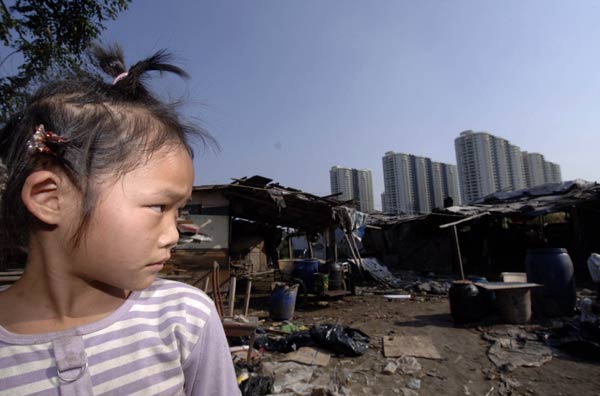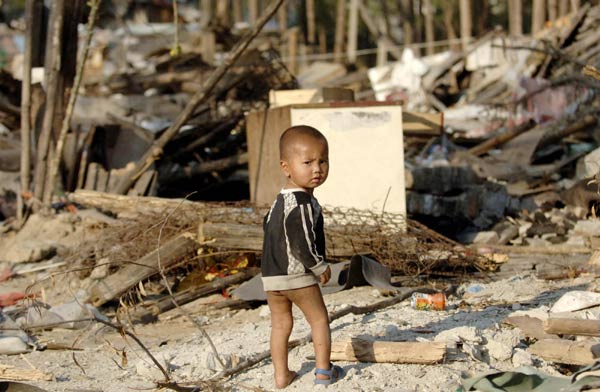Society
Bulldozers move in on Sanya shantytown
Updated: 2011-02-14 07:05
(China Daily)
 |
|
Yang Xiaoliu, a girl who had been living in a shantytown in Sanya, looks at her home that was demolished by the government prior to the traditional Spring Festival holiday. [Photo/Xinhua]
|
 |
|
Cai Quandong, a boy who had been living in a shantytown in Sanya, walks in front of the demolished house, Feb 9, 2011. [Photo/Xinhua]
|
The area, the biggest slum in the tropical city that has become a popular tourist destination, had 308 households and a population of more than 2,000, Xinhua News Agency reported on Sunday.
The city government started the forced demolition of the shantytown on Jan 19 with bulldozers and forklifts, the report said.
The shanties, mostly simple wood shacks, served as both pigsties and people's homes.
Most people who lived in the shanties were farmers from the rural areas of the province. They started to move there in the 1990s and raised pigs to earn a living, which earned them a better life than farming.
When reporters visited the shantytown during the Spring Festival holiday many residents still lived there, despite the fact that their homes had been torn down.
"We don't have a place to live in our home village. If they completely demolish here, we will be homeless," Chen Zugao, a resident in the area, was quoted as saying.
Some even insisted on staying after the shantytown was demolished.
"We've been here raising pigs for seven years. The government has demolished our homes, but we still have pigs to sell. We are not leaving," said Zhang Pomei, another resident.
"I understand why they want to demolish our shabby homes, as Hainan is trying to be an international tourist island, but we cannot leave without selling our pigs," said resident Liu Shengyang.
"Besides, why did they start demolishing the place before the Spring Festival? That leaves many of us without a place to sleep during the big festival."
The city government has responded by saying that the sheds in the area are illegal constructions and a safety risk and said it had informed the villagers of the demolition last December, and asked them to move before Jan 19.
Wang Rui'an, deputy head of Fenghuang town, where the area is located, said the reason for the demolition is that the area is a fire hazard, has a bad environment, bad public security, and it is difficult to implement family planning policies there.
"They are not local Sanya people. They come from other places and have been living in illegal houses here for many years. The government is not responsible for helping them find new places to stay," Wang said.
According to the local fire-fighting authorities, the area had two big fires in 2008, killing 20 pigs and a 3-year-old girl.
"We're worried that when young people go out to work and leave old people and children at home, it could be very dangerous if there is a fire," Xu Lidan, a local fire-fighting official, was quoted as saying.
As for the question of why the authority decided to force the demolition before the Spring Festival, Wang explained that a lot of fireworks during the Spring Festival might cause fire, and "many residents can go back to their hometowns during the festival (if their homes in Sanya are gone)".
China Daily
E-paper

Ear We Go
China and the world set to embrace the merciful, peaceful year of rabbit
Preview of the coming issue
Carrefour finds the going tough in China
Maid to Order
Specials

Mysteries written in blood
Historical records and Caucasian features of locals suggest link with Roman Empire.

Winning Charm
Coastal Yantai banks on little things that matter to grow

New rules to hit property market
The State Council launched a new round of measures to rein in property prices.
